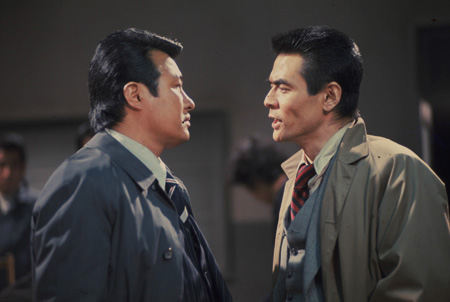Available on Dual Format Blu-Ray/ DVD now.
The filmmaker Kinji Fukasaku is best known to western cinema audiences for his final completed film, the operatically violent Battle Royale, which featured an island full of school kids forced to fight to the death. In Japan, he was known for his yakuza gangster thrillers, dramatising real-life incidents and focussing on the murky mix of murder and honour between gangsters. He was a huge influence on the likes of Miike Takashi, who rode the same wave of far-eastern extremism into the occidental consciousness in the late nineties and early years of the new century.
Made during an incredibly prolific period which also took in the Battles Without Honor and Humanity series and Graveyard of Honor, Cops vs Thugs stars long-time collaborator Bunta Sugawara (think Toshiro Mifune to Fukasaku’s Akira Kurosawa for a comparison) as Kuno, a dirty cop with close personal links to the Ohara crime dynasty. When a truce with the rival Kawade clan sours due to Kuno’s indirect involvement, a turf war breaks out. At the same time a tough new police lieutenant (Tatsuo Umemiya) arrives to restore order, forbidding any fraternising between the police and the Yakuza.
Cops vs Thugs is a fast-paced and thoroughly nihilistic take on the yakuza thriller. There are absolutely no heroes to be found here, and Japanese society is shown to be fuelled by greased palms and eyes looking the other way from all manner of activities. This is epitomised by Kuno, as gruff and merciless as any of the gangsters allegedly on the other side of the law. He’s also just as misanthropic and misogynistic; the treatment of women in this film is particularly bad, each depicted as mere chattel for these men.
If you can see beyond the films chilly moral tundra, you’ll find an unusually structured, labyrinthine story bursting from its lean run-time. The entrance of the lieutenant, essentially the plot’s catalyst, doesn’t occur until the second half of the film. Fukasaku, completely at ease with this genre by now, allows the characters to develop and the relationships become firmly established before igniting the touch paper. This works entirely in the film’s favour, and also cleverly diverts audience sympathies away from the crusading cop.
Fans of nineties cop dramas like NYPD Blue will recognise the jittery, handheld camera uses throughout, giving Cops vs Thugs a real documentary feel. The repeated scenes of both police and yakuza sitting down for dinner echoes Fritz Lang’s M in their implication that the police and criminals are two sides of the same coin. These scenes are also interestingly shot by a static camera from a low angle, like that of Yazujiro Ozu in the likes of Tokyo Story, creating a strangely domestic, almost fraternal atmosphere.
A satisfying and brutal thriller, with an influence that can’t be overestimated, Cops vs Thugs is not the most celebrated work from Kinji Fukasaku, but will grace the collection of any serious fan of far-eastern cinema, or the crime genre in general.
